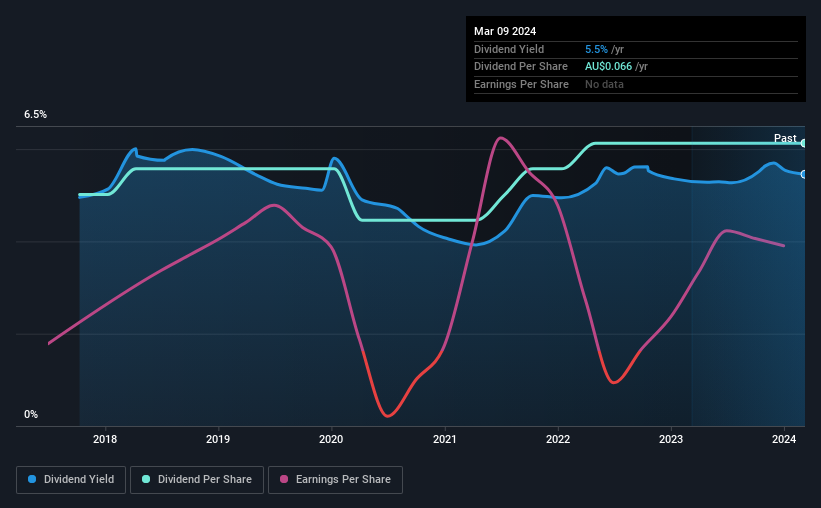Only Four Days Left To Cash In On Plato Income Maximiser's (ASX:PL8) Dividend
Readers hoping to buy Plato Income Maximiser Limited (ASX:PL8) for its dividend will need to make their move shortly, as the stock is about to trade ex-dividend. The ex-dividend date occurs one day before the record date which is the day on which shareholders need to be on the company's books in order to receive a dividend. The ex-dividend date is an important date to be aware of as any purchase of the stock made on or after this date might mean a late settlement that doesn't show on the record date. Accordingly, Plato Income Maximiser investors that purchase the stock on or after the 14th of March will not receive the dividend, which will be paid on the 28th of March.
The company's upcoming dividend is AU$0.0055 a share, following on from the last 12 months, when the company distributed a total of AU$0.066 per share to shareholders. Based on the last year's worth of payments, Plato Income Maximiser stock has a trailing yield of around 5.5% on the current share price of AU$1.21. Dividends are an important source of income to many shareholders, but the health of the business is crucial to maintaining those dividends. So we need to investigate whether Plato Income Maximiser can afford its dividend, and if the dividend could grow.
View our latest analysis for Plato Income Maximiser
Dividends are usually paid out of company profits, so if a company pays out more than it earned then its dividend is usually at greater risk of being cut. It paid out 78% of its earnings as dividends last year, which is not unreasonable, but limits reinvestment in the business and leaves the dividend vulnerable to a business downturn. We'd be worried about the risk of a drop in earnings.
Companies that pay out less in dividends than they earn in profits generally have more sustainable dividends. The lower the payout ratio, the more wiggle room the business has before it could be forced to cut the dividend.
Click here to see how much of its profit Plato Income Maximiser paid out over the last 12 months.
Have Earnings And Dividends Been Growing?
Stocks in companies that generate sustainable earnings growth often make the best dividend prospects, as it is easier to lift the dividend when earnings are rising. If earnings decline and the company is forced to cut its dividend, investors could watch the value of their investment go up in smoke. This is why it's a relief to see Plato Income Maximiser earnings per share are up 2.1% per annum over the last five years.
We'd also point out that Plato Income Maximiser issued a meaningful number of new shares in the past year. It's hard to grow dividends per share when a company keeps creating new shares.
Many investors will assess a company's dividend performance by evaluating how much the dividend payments have changed over time. In the last six years, Plato Income Maximiser has lifted its dividend by approximately 3.4% a year on average. We're glad to see dividends rising alongside earnings over a number of years, which may be a sign the company intends to share the growth with shareholders.
Final Takeaway
Is Plato Income Maximiser worth buying for its dividend? Earnings per share have been growing at a reasonable rate, and the company is paying out a bit over half its earnings as dividends. It might be worth researching if the company is reinvesting in growth projects that could grow earnings and dividends in the future, but for now we're on the fence about its dividend prospects.
However if you're still interested in Plato Income Maximiser as a potential investment, you should definitely consider some of the risks involved with Plato Income Maximiser. We've identified 4 warning signs with Plato Income Maximiser (at least 1 which is a bit unpleasant), and understanding these should be part of your investment process.
Generally, we wouldn't recommend just buying the first dividend stock you see. Here's a curated list of interesting stocks that are strong dividend payers.
Have feedback on this article? Concerned about the content? Get in touch with us directly. Alternatively, email editorial-team (at) simplywallst.com.
This article by Simply Wall St is general in nature. We provide commentary based on historical data and analyst forecasts only using an unbiased methodology and our articles are not intended to be financial advice. It does not constitute a recommendation to buy or sell any stock, and does not take account of your objectives, or your financial situation. We aim to bring you long-term focused analysis driven by fundamental data. Note that our analysis may not factor in the latest price-sensitive company announcements or qualitative material. Simply Wall St has no position in any stocks mentioned.

